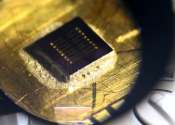Simultaneous detection of uranium isotopes and fluorine advances nuclear nonproliferation monitoring
Combining two techniques, analytical chemists at the Department of Energy's Oak Ridge National Laboratory have become the first to detect fluorine and different isotopes of uranium in a single particle at the same time. Because ...









